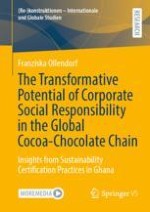2023 | Buch
The Transformative Potential of Corporate Social Responsibility in the Global Cocoa-Chocolate Chain
Insights from Sustainability Certification Practices in Ghana
verfasst von: Franziska Ollendorf
Verlag: Springer Fachmedien Wiesbaden
Buchreihe : (Re-)konstruktionen - Internationale und Globale Studien
